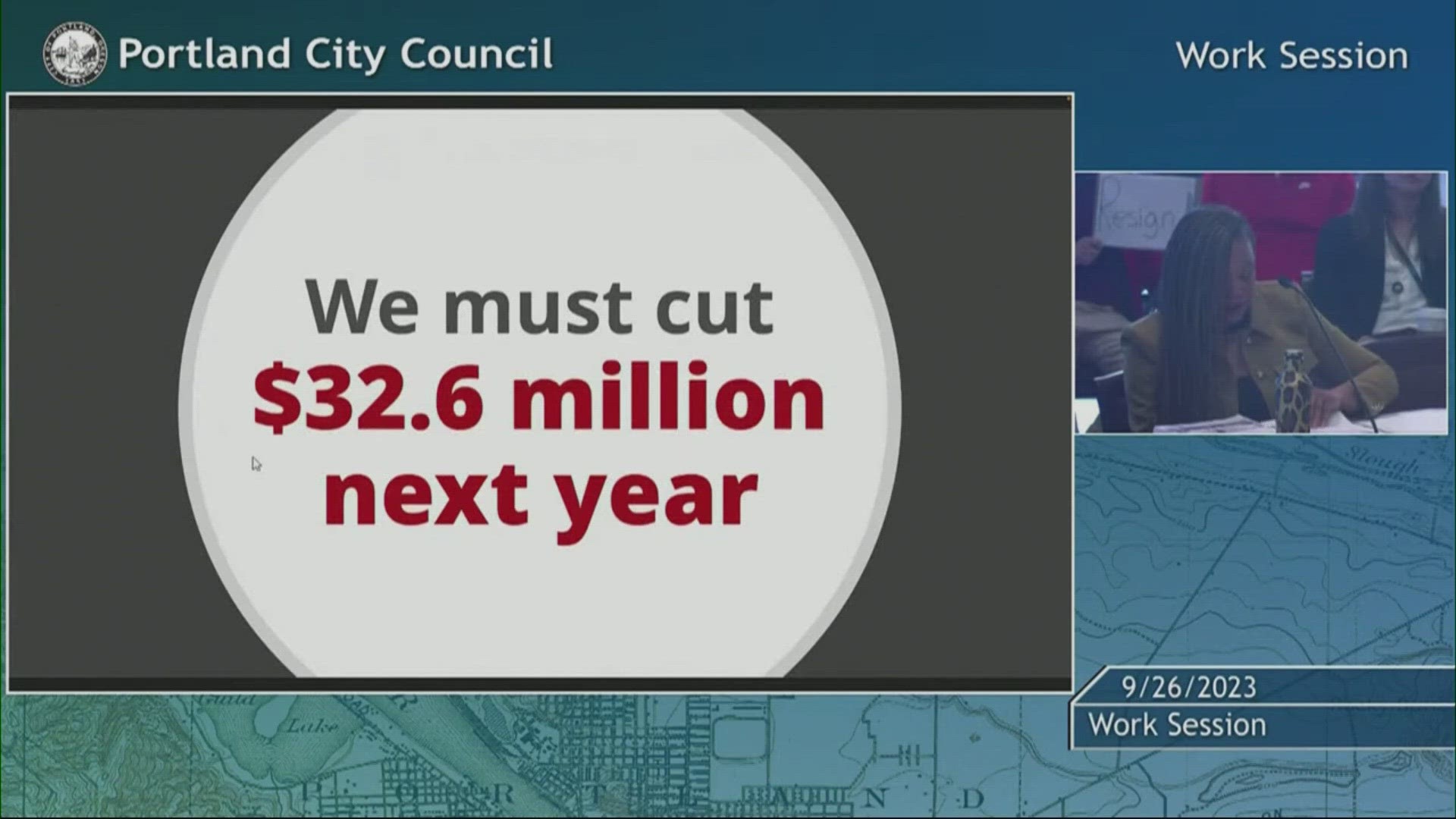PORTLAND, Ore. — The Portland Bureau of Transportation is proposing a $32 million budget cut for the 2024-25 fiscal year to make up for a projected revenue shortfall. PBOT leaders unveiled the plan at a city council work session Tuesday morning, warning that Portland will see major transportation service reductions next year if the cuts can't be prevented.
"I will be frank; I expect this budget cycle to be the most painful that any of us have faced during their time on this council," Commissioner Mingus Mapps, who oversees PBOT, said at the start of Tuesday's meeting, adding that there is "no way to cut $30 million from PBOT's budget without deeply undermining Portland's transportation system."
The proposed cuts would reduce funding in every operational area by 22% to 47%, according to a presentation from PBOT Director Millicent Williams, with the largest cuts hitting administration, engineering, parking enforcement and project planning. A total of 127 full-time equivalent positions would be cut, 39 of which are already vacant.
Specific impacts of cutbacks
Each of PBOT's department directors gave a brief presentation about how the cuts would impact their operations, starting with reductions in administrative capacity and the elimination of funding for campsite cleanups. Right-of-way management cuts would impact subsidies for community events like the Rose Festival parades.
The engineering cuts would include a "complete reduction" of pavement preservation work and a reduction in ADA ramp construction that could put the city out of compliance with a 2018 ADA lawsuit settlement without alternative funding. It would also halt landslide and emergency repair work.
"Landslide and emergency repair work, I don't see any planet on which you could cut that," Mayor Ted Wheeler interjected. "I mean if a landslide happens on West Burnside or something, you're not going to attend to it? What does that mean?"
"We need to come up with some funding to do that," Engineering Services Group Director Todd Liles replied. "They'll sit there. I mean, we have landslides right now we can't afford to complete."
Maintenance and operations cuts would halt pavement crack sealing work and pause mowing and vegetation management at 171 locations. Snow plowing would stop on about 223 lane-miles of secondary routes. Potholes would still be filled, but at a slower pace, and all graffiti cleanup on PBOT assets would cease. Parking enforcement levels would also be reduced.
"Abandoned vehicles, derelict RVs and other vehicles in violation will remain in the right of way for extended periods of time," Parking and Regulatory Services Group Director Mark Williams said.
Cuts to the Policy, Planning & Projects department would end public plaza maintenance, "quick build" safety projects and community programming such as Safe Routes to School, Sunday Parkways and Biketown for All. Overall, the bureau would have less ability to engage the public and quickly respond to community concerns.
Emergency repairs would still be available for traffic lights and streetlights that get knocked down, as well as vegetation removal for safety reasons, but damaged mid-block streetlights wouldn't be replaced and the 822-SAFE line for reporting traffic safety concerns would be shut down.
Chronic budget gaps and revenue ideas
The shortfall comes even after five successive years of cuts that have already totaled up to $20.5 million and 60 staff positions and depleted the bureau's $63 million reserve fund, according to Williams. The budget woes stem from a structural problem, Mapps added: PBOT is funded by gas taxes and parking fees, but electric vehicle adoption is eating into gas tax revenue and the rise of work-from-home has caused parking meter revenues to plummet.
Mapps noted that he had already proposed two new funding sources for PBOT since taking over the bureau. The first, a street fee, "went over like a lead balloon," he said, and the council also cut a planned parking fee increase from 40 cents down to 20 cents. There have been discussions about switching to vehicle mileage taxes to replace gas taxes at the state and federal level, he said, but that solution is years away from being available at the local level.
In terms of new ideas, Williams said the council could consider making reductions to other bureaus, freeing up some of the city's general fund dollars to move over to transportation services or to take on some expenses that currently fall on PBOT, such as debt payments for the Sellwood Bridge project.
The city could also restore the utility license fee program payments to PBOT, she said. The program collects payments from utility providers as "rent" for their use of the public right-of-way, but PBOT stopped receiving a share of that funding in 1988. Bringing the allocation back at 1988 levels would provide $25 million in annual revenue, she said — but that approach would again mean a reduction in funding for other bureaus.
The conversation largely ended there. The commissioners all stressed that Tuesday's meeting marked the beginning of the budget process, so the topic will be revisited at future meetings. But Wheeler and multiple commissioners expressed concern about both the proposed cuts and the idea of pulling funding from other bureaus and priorities to close the gap, especially public safety. Wheeler also said he was concerned that the PBOT funding discussion was happening "in a vacuum."
"The context in which we're having this conversation is that our city is in crisis," he said. "And it is very, very slow to recover from the economic downturn associated with COVID and all of the other issues that we've dealt with in this city. We need activation. We need events. We need to bring community together. We need to support safety issues, so that people feel they can walk and bike safely in our community. So I'm not willing, frankly, to accept most of the cuts that are put on the table, but nor am I willing to take resources that are desperately needed in public safety."

